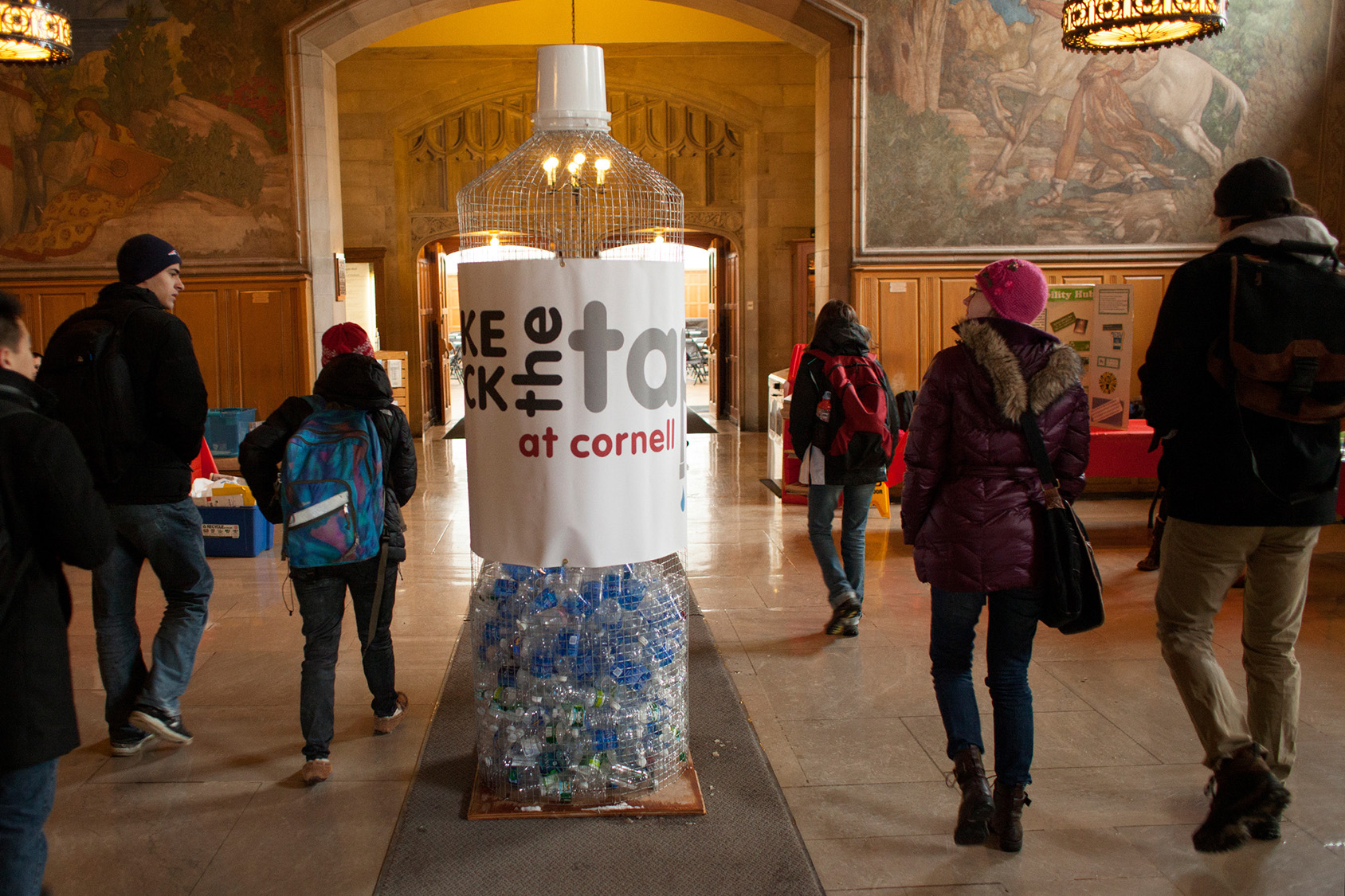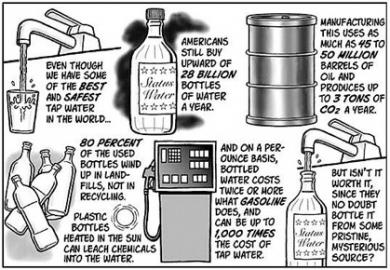Between 350,000-400,000 single-serving bottles of water are sold on the Cornell campus annually, and more than 40,000 five-gallon carboy bottles of water are purchased for use in campus water coolers. Bottled water costs the campus community an estimated $640,000 per year, butthe same volume of tap water would cost just $1,000. Cornell’s annual consumption of bottled water causes nearly 115,000 kg of CO2 emissions, or the equivalent of 265 barrels of oil. “Take Back the Tap” (TBTT) was an education/awareness campaign at Cornell to reduce bottled water consumption, thereby also reducing associated costs, energy use, and GHG emissions.

The goal includes a sustained behavior change even as students graduate and leave Cornell. The club focuses on changing the Cornell population’s attitudes and habits regarding bottled water and making tap water more appealing and convenient to the campus community. TBTT owns four 10-gallon water jugs that they loan out for informal events, such as races, and three 3-gallon water dispensers that are available for more formal events, such as graduation receptions.
Achievements
The TBTT campaign is making a difference: bottled water sales at campus convenience stores and community centers have decreased by roughly 25%. Other recent achievements include:
-
TBTT education is a part of orientation.
-
All incoming students receive reusable bottles.
-
Cornell’s design standards for new buildings and renovations now include bottle fillers.
-
Many existing drinking fountains have been upgraded with bottle fillers.
-
An inventory of bottle filling stations has been posted online.
-
Inline water coolers, which are fed by Cornell water, are a sustainable, cost effective option to replace carboy style water coolers. More than 25 inline coolers have been installed to date.
Bottle-Free Events
Tips on how to host bottle-free events are included in the Sustainable Events Planning Guide. The Guide is also available through the Cornell Event Planning website. Bottled water sales at campus events have, however, not declined, emphasizing the need for increased outreach and education around green event planning. Green Teams are working to identify existing communications channels and processes through which university events are typically planned and to advocate for making events bottle-free.
Reduce Bottle Usage
-
Stop buying single-serving bottles; fill a reusable cup, bottle, or pitcher instead. All CU Dining locations have tap water available for free. All CU buildings have drinking fountains, many of which with convenient bottle fillers. Water bottles are available for purchase from The Cornell Store and many CU Dining locations. Find the bottle filling station closest to you.
-
Exchange your office’s 5-gallon carboy-style water cooler for one that connects to the building’s tap water supply. The CU Office for Procurement Services has awarded a contract to Mister Koffee to provide this service on campus. Floor and counter top units are available with filtration, heating, and cooling options starting at just $25/month (no additional installation or maintenance fees). Visit Cornell's Procurement Services website to find Mister Koffee on eShop.
-
Work with your caterer to host bottle free events. The CU Sustainable Events Planning Guide has checklists and contact information for staff and volunteers that can help you.
For more information, contact the Campus Sustainability Office or the student Take Back the Tap club.
Cornell's Tap Water
Safe
Cornell produces its own drinking water using Fall Creek as a source. The water is treated and regularly tested at the campus Water Filtration Plant. The US federal government requires far more rigorous and frequent safety testing and monitoring of tap water than bottled water. Cornell’s yearly water quality report is available here.
Inexpensive
 Bottled water costs the campus community an estimated $640,000 per year, but the same volume of tap water would cost just $1,000. If you don’t like the taste, buy a filter for your tap or a filtering bottle; it will quickly pay for itself.
Bottled water costs the campus community an estimated $640,000 per year, but the same volume of tap water would cost just $1,000. If you don’t like the taste, buy a filter for your tap or a filtering bottle; it will quickly pay for itself.
Sustainable
It takes more than 1.5 million barrels of oil to meet America’s demand for bottled water each year (Earth Policy Institute). 80% of water bottles consumed in the US end up in a landfill rather than recycling.
